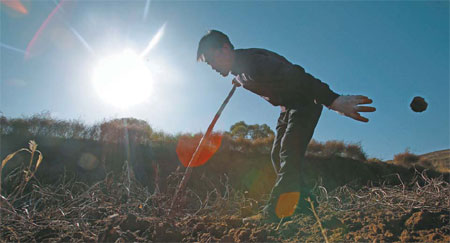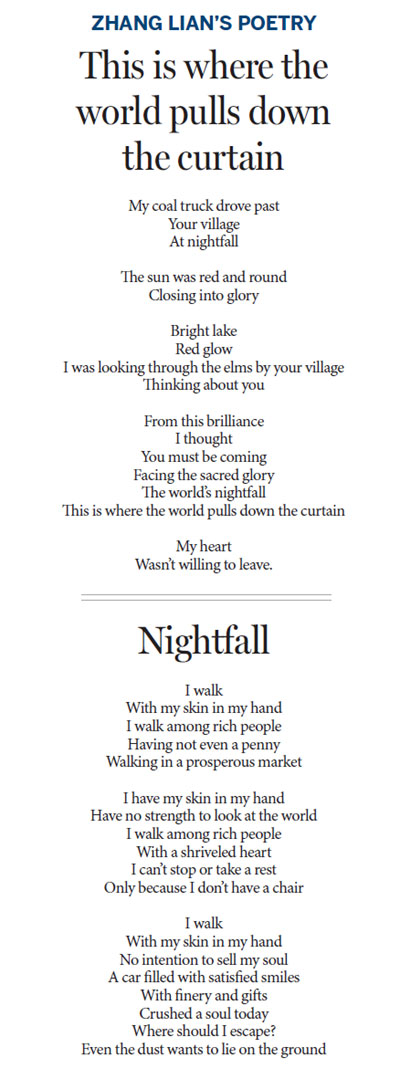Farmers harvest a crop of poetry
Updated: 2012-11-06 10:20
By Peng Yining (China Daily)
|
|||||||||||
 |
|
Kang Pengfei, 35, plowing his potato field, changed his life by reading and writing novels. |

"Misunderstanding and disdain are common events for rural writers," said Ma Jianguo, a 43-year-old farmer and construction worker, and the only poet in his village.
The walls of his living room are covered with his work, mainly classical-style Chinese poetry and aphorisms, written on white paper and marked with his seal.
He has displayed his poems at a May street market in his village every year since 2007. He pastes the papers containing his work on a 2-sq-m piece of hardboard and writes four large characters at the top: Shi Ci Jiao Liu, or Poetry and Phrase Workshop.
"I have no one to talk to about writing. I am so lonely and anxious that I beg for comments, whether they are good or not," he said. "Only a few people stopped by my poetry sign. Most thought I was ridiculous, and some said I was crazy. They asked, 'Why didn't you bake a potato if you had enough time on your hands to write that nonsense?'"
Although he lives in the deserted inland and rarely leaves his village, Ma's work is mostly about life and the fertile environment around Jiangnan, an area on the lower reaches of Yangtze River.
"It needs imagination," he said. "When I look far into the distance, I always imagine that beyond the yellow hills there are rivers, lakes, trees and flowers, just like the place I have always wanted to live."
In the dusky light, Ma curled up by the stove, and his calloused hands opened a notebook on a low table.
"The clear stream holds a lonely boat," he wrote, while the night wind whistled outside and the snow beat against the window.
"Flowers are falling like snow ...,"he continued. The glow from the fire cast his shadow on the walls.
"In poverty-stricken areas, literature can be a strong spiritual force and helps people to survive. Besides, there aren't many other pastimes, so writing is likely to be popular there," said Su Bingpeng, senior editor of Yellow River Literature, a major publication in Ningxia. "But it's hard to make money by writing."
Writers are paid around 30 yuan per 1,000 words, but the rate is falling as the magazine's circulation declines.
"Even it doesn't make money, I still love writing," said Zhang Lian, the poet. "I believe people have the right to enjoy the beauties of nature and literature, even without money or education."
Writing is an impulse deep inside a person's instincts, he said. When he had acute hepatitis at age 10, Zhang's father dragged him 20 km to the hospital on a wooden litter. They were moving along a bumpy country road, which cut through flat, desolate ground, when a gust of wind woke the sick boy with the dust it stirred. At first, he saw the pink-tinged sky on the horizon and then the setting sun reddening the heavens.
"It was sad, but magnificently beautiful," he said. "I had tears in my eyes. That was the moment I knew I wanted to write."
He later recast the scene in the poem This Is Where the World Pulls Down the Curtain.
"You can curse, or escape, when life corners you," he said. "Or, you can write a poem."
Contact the reporter at pengyining@chinadaily.com.cn
Related Stories
Book fair opens in Russian Siberia 2012-11-02 11:02
Bram Stoker's restored 'Dracula' desk up for auction 2012-11-01 15:08
Romano: Americans look East now 2012-10-30 09:44
Philosophical melting pot 2012-10-30 09:35
English animal tales now in Chinese 2012-10-23 10:26
Today's Top News
Rescuers race against time for quake victims
Telecom workers restore links
Coal mine blast kills 18 in Jilin
Intl scholarship puts China on the map
More bird flu patients discharged
Gold loses sheen, but still a safe bet
US 'turns blind eye to human rights'
Telecom workers restore links
Hot Topics
Lunar probe , China growth forecasts, Emission rules get tougher, China seen through 'colored lens', International board,
Editor's Picks

|

|

|

|

|

|





